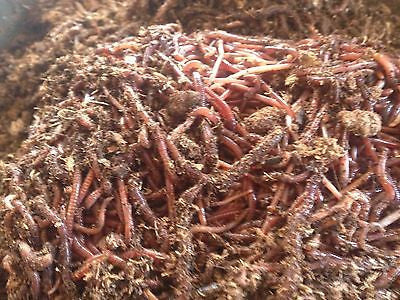Get Red Wiggler Worms - Perfect for Composting and Gardening
Wiki Article
Red Wiggler Worms Demystified: Unlocking the Secrets of Vermiculture for Greener Living and Nutrient-Rich Dirt
In the realm of sustainable methods for enhancing soil quality and advertising eco-conscious living, red wiggler worms play a crucial yet commonly overlooked duty. These humble creatures have the exceptional ability to transform natural waste into nutrient-rich spreadings that function as a potent all-natural plant food. By diving right into the world of vermiculture, one can reveal a variety of advantages that extend far past traditional composting methods. Understanding the intricacies of taking care of these worms, optimizing their environment, and utilizing their castings can cause a greener way of living and much healthier dirt for plants to thrive.The Role of Red Wiggler Worms
Red Wiggler worms play an essential function in composting systems by successfully breaking down raw material right into nutrient-rich castings. These voracious eaters eat a selection of natural products, such as kitchen area scraps, backyard waste, and paper products. As they feed, the worms' digestion processes damage down the natural matter right into a penalty, dark, and nutrient-dense product called worm castings or vermicompost.The spreadings created by Red Wiggler worms are highly helpful for dirt health and plant development. They are abundant in important nutrients like phosphorus, potassium, and nitrogen, which are important for sustaining healthy plant development. Additionally, worm spreadings have useful microbes and enzymes that assist boost dirt framework, boost water retention, and enhance nutrient uptake by plants.
Benefits of Vermicomposting

It enhances dirt structure, enhances soil oygenation, and enhances dirt dampness retention. Vermicompost additionally enriches the dirt with vital nutrients like potassium, nitrogen, and phosphorus, advertising plant development and total dirt fertility.
In addition, vermicomposting assistances sustainable horticulture techniques by offering a natural and chemical-free choice to artificial plant foods. Red Wiggler Worms. This eco-friendly approach not only improves the soil but likewise helps in reducing reliance on harmful chemicals, advertising a greener and more lasting method of horticulture
Establishing a Worm Bin
When establishing a worm bin for vermicomposting, correct setup is important to ensure the success of the composting process. The very first action in establishing up a worm container is choosing an appropriate container.After including the bedding, present the red wiggler worms to the bin. It is suggested to begin with a tiny number of worms and gradually enhance as they increase. The worms ought to after that be offered with food scraps such as fruit and veggie peels, coffee grounds, and eggshells. It is necessary to stay clear of including meat, dairy, oily, or salted foods to avoid drawing in bugs and creating unpleasant smells.
On a regular basis check the dampness degrees and temperature in the worm container to make sure ideal problems for the worms. With proper arrangement and upkeep, the worm bin will properly transform organic waste right into nutrient-rich compost for your plants next and yard.
Harvesting Worm Spreadings
To efficiently collect nutrient-rich worm castings from your vermicomposting system, an organized harvesting approach is essential. There are a couple of vital steps to comply with to make sure an effective process when it comes time to collect the worm spreadings. To start with, quit adding fresh food scraps to one side of the worm container for a number of weeks before harvesting. This encourages the worms to move to the side with fresh bed linens and food, making it simpler to dig the castings from the opposite side.
Troubleshooting Common Issues
Recognizing and addressing typical difficulties that may arise during the vermicomposting process is crucial for preserving a healthy and balanced and productive worm bin. Adding excess food scraps can lead to an accumulation of moisture and level of acidity in the worm container, potentially harming the worms. Another concern is unpleasant smells emanating from the worm bin.
Furthermore, if the worm populace is declining or the worms show up undesirable, it might be because of ecological stress factors such as extreme temperatures or pH levels. Keeping track of these elements and making required changes is crucial for the health of the worms. By repairing these usual problems without delay, vermicomposters can make sure a smooth and successful vermicomposting procedure while maintaining a growing worm populace.

Conclusion
To conclude, red wiggler worms play a critical duty in vermiculture by breaking down raw material into nutrient-rich soil. The advantages of vermiculture include greener living and improved soil top quality. Establishing a worm bin is essential for successful vermiculture, and harvesting worm castings offers beneficial Recommended Reading compost for horticulture. By recognizing and fixing usual issues, individuals can unlock the keys visit the website of vermiculture for lasting living and healthier soil.As they feed, the worms' digestive system processes damage down the organic matter into a fine, dark, and nutrient-dense product recognized as worm castings or vermicompost.
The castings produced by Red Wiggler worms are extremely valuable for soil health and plant development. Adding excess food scraps can lead to a buildup of wetness and level of acidity in the worm container, possibly damaging the worms.Furthermore, if the worm populace is decreasing or the worms show up undesirable, it might be due to ecological stress factors such as extreme temperatures or pH levels. Establishing up a worm bin is necessary for successful vermiculture, and collecting worm spreadings supplies useful garden compost for gardening.
Report this wiki page